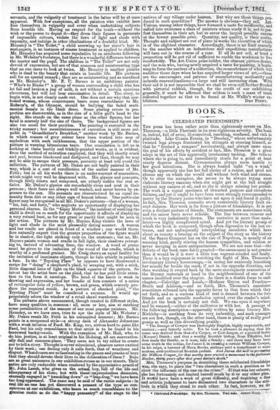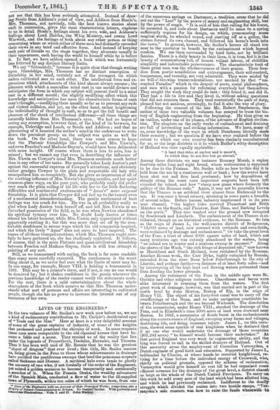BOOKS. •
CELEBRATED FRIENDSHIPS.*
Tim press has been rather more than righteously severe on Mrs. Thomson,—a little Pharisaic in its over-righteous severity. The book is, indeed, full of error, ill-conceived, rambling, confused, and rich in platitude. Like Cousin Feenix, in "Dombey," whose unfortunately twisted legs always frustrated his attempts at steering himself, so that he " fetched a compass" involuntarily, and always came upon the goal of his efforts by accident at last, Mrs. Thomson is a great adept in the art of this apparently involuntary tacking. She tells us where she is going to, and immediately steers for a point at least ninety degrees distant. Circumstances always seem hostile to her good intentions. She is always hauled tight "on a wind," though apparently she has her full choice of a course, and need not choose any on which she would sail without both wind and stream. Or to alter the metaphor, she seems to be always trying most elaborate literary cannons when she might get at the ball straight without any cannon at all, and so she is always missing her pocket. The work is a signal specimen of thwarted purpose and circuitous failures, and yet it ought to have been more strongly recommended to mercy by the literary juries who have sat upon it and found it guilty. In fact, Mrs. Thomson commits every conceivable literary fault ex- cept dulness. Her work is far from a picture of friendships. It is not even a distinct picture of friends. The statements are sometimes wild, and the minor facts never reliable. The line between rumour and truth is very indistinctly drawn. The narrative is more than undu- latory—a highly complicated spiral. And yet the literary gossip of which the book is composed, though often digressive to the last ex- treme, and not unfrequently interpolating anecdotes which have about as remote a bearing on the subject of the story as the history of the Saxon Conquest has on the rise of Napoleon, is usually of an amusing kind, gently stirring the human. sympathies, and seldom or never merging in mere antiquarianism. We are not sure that—the defects of the book once fairly granted—the amusement is not greater than it would be if it were a little less vagrant-minded and faulty. There is a lazy enjoyment in watching the flight of Mrs. Thomson's involuntary literary boomerangs,—in seeing her anxiously launcliiaig her missile far beside the mark., if not in the opposite direction, aanndd then watching it swayed back by the mere atmospheric necessities of the literary materials at hand to the neighbourhood of one of the names inscribed over the chapter. As there is a double focus to each chapter,—Coleridge and Lamb,—Madame Guyon and Fenelon- Steele and Addison,—and so forth, Mrs. Thomson's anecdotes sometimes rebound into the opposite focus to that from which they set forth, and so a curious kind of reel is danced between the two friends and an agreeable confusion spread over the reader's mind. And yet the book is certainly not dull. We Can open it anywhere and be amused,—either at the authoress or with her. A passage of the following description—apparently written by sonic literary Mrs. Nickleby—is soothing from its very imbecility, and such passages are not few, though, on the other hand, there is plenty of really good gossip as well as this diversifying prattle :
" The lineage of Cowper was thoroughly English, highly respectable, and ancient ; —and latterly noble. Yet he took a pleasure in saying that his name was derived from that of a Cooper, or Cow-keeper, or a general dealer (Kooper) Dutch ; and that a worthy Scottish bishop, from Fifeshire, had first made the family, as it were, into a family ; and there may have been some truth in the notion, forJames I. in creating a certain William Cowper, in his reign, a baronet of Nova Scotia, perhaps paid a compliment to some zealous, anti-puritanical Scottish prelate. And James did well in promoting Sir William Cowper, for that worthy man erected a ownument to the judicious Hooker, thirty years after that great divine's death."
Mrs. Thomson's purpose in describing these celebrated friendships was, she says, to place the " two characters in such a position as to show the influence of the one on the other." If that was her scheme, she has fortunately not limited herself much by it or any other plan. It world have been a work of great difficulty, and requiring a fine and artistic judgment to have delineated two characters in the atti- tude in which they stood to each other. In fact, however, we do
* Celebrated friendships. By Mrs. Thomson. Two 149. James Hogg. - not see that this has been seriously attempted. Instead of draw- ' u Steele from Addison's point of view, and Addison from Steele's, Mrs. Thomson, not unwisely, tells the beat known stories about each in succession, gives the most characteristic letters, explains to us in detail Steele's feelings about his own. wife, and Addison's feelings about Lord Halifax, the Whig Ministry, and young Lord Warwick, and the feelings of both about any other person or thing concerning whom or which either of these men had distinctly recorded their views in any brief and effective form. And instead of keeping each pair of friends on the stage together, they alternate usually in their appearance, each having the world to himself while he is before it. In fact, we have seldom opened a book which was fortunately less fettered by any distinct literary limits. We say "fortunately," because it is quite clear that though writing upon friendships, Mrs. Thomson has no distinct conception of fneadship in her mind, certainly not of the strongest tie which unites cultivated men to each other. The intellectual form and ex- pressions which attachments of this kind almost always assume; the pleasure with which a masculine mind cast in one mould divines and anticipates the form in which any subject willpresent itself to a mind cast in a different mould ; the slightly modifying effect which this knowledge and anticipation has upon the characteristic forms of each man's thought,—modifying them usually so far as to prevent any rude and violent collision, and yet, on the other hand, rather heighten' the individuality of thought in each, so as to get the full benefit and pleasure of the shock of intellectual difference—all these things are naturally hidden from Mrs. Thomson's eyes. We had no hopes of seeing any conception, however faint, of the kind of tie between, for example, Coleridge and Lamb, or Steele and Addison ; and that no glimmering of it haunted the author's mindin the endeavour to write down the prevalent gossip on the subject was quite as well for the book. On the other hand, there was some reason to hope that the Platonic friendships like Cowper's and Mrs. Unwin s, and even Fenelon's and Madame Guyon's, would have been delineated with more insight. Of course where there is less to miss, less is missed; but we cannot say that even in describing the influence of Mrs. Unwin on Cowper's mind Mrs. Thomson succeeds much better than in any other of her tasks. She naturally takes Lady Austen's part against the successful captress of Cowper's attentions, and obviously rather grudges Cowper to the plain and respectable old lady who monopolized him so completely. But she gives no impression at all of the soothing influence of Mrs. Unwin's knitting-needles, and her quiet common-place ways, on the poor poet, who probably really did prefer very much the plain sailing of his life with her to the little fluttering difficulties and sentimental excitements of "Anna's" more exigeant friendship. It is plain that Cowper did not feel up to the tumult even of a sentimental misunderstanding. The gentle excitement of hurt feelings was too much for him. He was in all probability really as glad when Lady Austen took herself off, and left Mrs. Unwin in un- disturbed possession of the field, as he was when Newton abandoned his spiritual tyranny over him. No doubt Lady Austen at times stirred his latent humour, while Mrs. Unwin only appreciated without apparently exciting it ; but this was more than set off by the com- fortable confidence in serene ways which his old companion inspired, and which the lively " Anna" do'es not seem to have inspired. The traces of all these tranquil emotions, which Mrs. Thomson onght care- fully to have gathered up, she has studiously neglected. It follows, of course, that in the more Platonic and quasi-intellectual friendship between Fenelon and Madame Guyon, there is still less attempt at painting of any sort. Still, as we commenced with saying, the book is far more readable than many more carefully executed. The carelessness is the worst thing about it, as we never feel sure what the limits of error may be. In one essay, for example, Henry VIII. is holding a tournament in 1595. This may be a printer's error, and if not, is one no one would be deceived by; but it shakes confidence in the gossip wherever the previous knowledge of the reader cannot verify the statements made. For the rest, there is a mild entertainingness about the whole atmosphere of the book which assures us that Mrs. Thomson under- stands what sort of persons and affairs are interesting to cultivated people, though she has no power to increase the interest out of any resources of her own.































 Previous page
Previous page